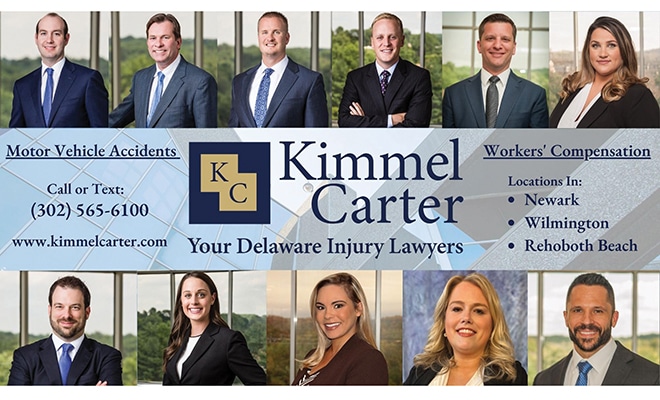First Responders & PTSD
By Kimmel Carter
We ask so much from Delaware’s first responders when it comes to helping those in need. Police, Paramedics, EMTs, and Firefighters risk their own safety every time they leave for work. They face both physical and emotional damages day after day; their daily stress level combined with the fast-paced work environment, significant physical demands and lack of downtime and sleep would be catastrophic to the average person.
Sadly, Delaware has had horrific deaths and injuries occur in the last few weeks. The average person reads about these travesties, but first responders are thrust into the heart of these accidents, risking their lives to save the life of a stranger. Whether it is a fatal car accident, a death in the workplace, a homicide, or other tragedy, first responders care for and protect the most helpless and critically injured of all. They do this day after day after day.
First responders typically portray themselves as though nothing bothers them. They compartmentalize the violence they deal with on a daily basis. They are calm and controlled amid chaos and disorder. After the adrenaline wears off, they can re-live the worst moments over and over; seeing the same trauma, hearing the same sounds and smelling the same scents. Oftentimes, they must return to the exact same location where the trauma occurred, which forces them to remember their prior call whether they want to or not.
Post-Traumatic Stress Disorder (PTSD) develops in some people who experience a shocking, scary, or dangerous event. We often see this in our Military Veterans community; however, it does not take a tour of combat to develop and struggle with PTSD symptoms. Any traumatic experience can trigger PTSD symptoms.
It is natural to feel afraid during and after a traumatic situation. But first responders must constantly push this fear to the side in order to put their job and responsibilities to our citizens first. Fear can trigger many split-second changes in the body to help defend against violence and danger. This “fight-or-flight” response is a typical reaction meant to protect a person from harm. First responders suppress that natural response in order to serve and protect. In some people, the suppression of intrusive thoughts can only last so long, and they eventually come to the surface when least expected.
Nearly everyone will experience some degree of PTSD symptoms following a traumatic event. Most people recover from the initial PTSD symptoms on their own, however those who do not immediately identify and address symptoms of PTSD may continue to have ongoing stress and anxiety. Those who continue to suffer from PTSD may suffer from insomnia, hypervigilance, stress, and self-destructive behavior.
Though PTSD is not a visible injury, it falls under the definition of “occupational disease” for purposes of workers’ compensation. Therefore, if it can be proven that the PTSD is related to the work activities, the first responder may qualify for workers’ compensation benefits to treat the PTSD. These workers’ compensation benefits may include medical expenses and lost wage compensation.
Even the most qualified and experienced First Responders suffer the emotional consequences of a job that requires daily immersion in life and death circumstances. Firefighters and EMTs are statistically more likely to die of self-inflicted injuries than in the line of duty. If you or a first responder that you know is showing signs of PTSD, quick access to care may go a long way in securing their peace of mind.
Navigating a work injury claim on your own can be difficult and stressful, even without PTSD. Adding a diagnosis of PTSD to your plate may make it nearly impossible to manage your workers’ compensation claim on your own. First responders dealing with PTSD will find having an advocate on their side to review and explain their potential entitlement to workers’ compensation benefits to be invaluable. Consultations with me are always free, and as stress-free as I can make them. You should expect nothing less from your Delaware Injury Attorney!
For more information, or to schedule a free consultation, please call (302) 565-6100


